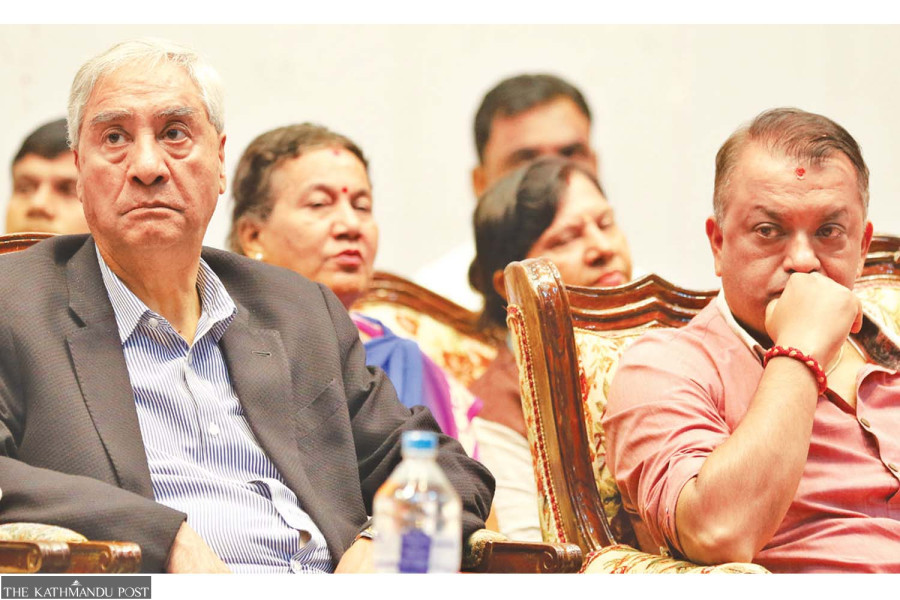Politics
Thapa proposes holding 15th Congress convention by mid-December 2025
General secretary heavily criticises party’s top leadership and offers some suggestions.
Post Report
Nepali Congress General Secretary Gagan Kumar Thapa has proposed to hold the party’s 15th general convention on schedule—or by mid-December 2025.
Presenting an organisational paper at the ongoing Central Working Committee meeting of the party on Thursday, Thapa proposed a timeline for concluding its next general convention by mid-December 2025. Thapa himself is an aspirant for president in the upcoming general convention that will elect the party’s new leadership.
Some others too aspire to lead the ‘grand old party’ of Nepali politics. The 14th general convention was held in December 2021. The party charter gives each elected body a tenure of four years. But if the general convention could not occur within four years, the party charter provisions a one-year extension. Further, Nepal’s constitution authorises a six-month deferral if an emergency makes holding the convention difficult. Thapa also proposed the September-October window for holding a convention to formulate the party’s policies.
In his paper, Thapa has proposed concluding the conventions of lower party committees by the end of November this year. Under the plan, ward conventions would have to be held by the end of November and conventions of village and city committees by the middle of December later this year.
Thapa also proposed giving elected party representatives including the party president more authority in his paper tabled at the party's central working committee meeting. Apart from some office bearers, the party president should be able to nominate and appoint remaining office bearers and central members, Thapa proposes. As provisioned in the Congress charter, the party president can appoint or nominate the central treasurer and three dozen central members.
Thapa also proposes holding the party’s district conventions by mid-September 2025, provincial conventions by mid-November and the general convention by mid-December 2025. The Nepali Congress chooses its leadership from the ward level to the centre through election. The party conducts four layers of direct elections alongside cluster-wise voting.
Thapa highlights various organisation-related activities and has stated that the party has started renewing 869,511 active members at the district level. The Congress has arranged for supporters to apply for the party membership online. All party activities from the district to central levels are now digitally archived, Thapa’s paper stated. The Congress has 13 sister organisations, 26 well-wisher organisations and 37 Janasamparka Samiti (outreach committees) in various countries.
“Despite this strength, in the 2022 elections, we lost seven percent of the popular vote that we received in 2017. In the provinces, we lost five percent popular vote while we were the first party in the local elections,” Thapa said.
He cited the party fighting the local level elections largely on its own for the impressive results. The Nepali Congress had fought the local, provincial and federal polls in an alliance with other parties such as the CPN (Maoist Centre), the CPN (Unified Socialist), the Janata Samajbadi Party and the Rastriya Janamorcha. The local electoral alliances were discretionary while the party strictly upheld the alliances in the other two elections.
Though the Congress is the largest party at the local level and leads a majority of provincial governments, and has the largest pie in the central government, “there is mass frustration among our supporters, voters, leaders and cadres,” Thapa added. “The time has come for the party to decide whether to defend these governments or question the office holders for their poor performance.”
Thapa also pointed out several anomalies in the party from top to bottom, such as unhealthy competition and the politics of negation plaguing the party. These problems had affected the party committees’ regular functioning, Thapa observed.
“Some committees have failed to convene meetings regularly. There is also the tendency to corner minority voices by the majority and party election losers not cooperating with the winners,” Thapa wrote in his paper.
The relationship between leaders and cadres should be equal but that is not happening, Thapa shared his take.
“Lack of debate and discussions at the party’s top level has impacted lower committees,” Thapa said. “Those who contributed greatly to the party are complaining of injustice. Without internal democracy, our ideology, principle, commitment and dedication have weakened.”
The party machinery runs only during the election, Thapa said, accusing Congress members of believing that voting for the party is their only duty.
His accusations are directed at the party leadership. Thapa, popular leader among youths, also pointed out the lack of accountability and a culture of punishment and reward in the party, and failure to share opportunities equally among party workers and to give responsibilities to qualified persons.
“There is also a disconnect between the government and the party,” Thapa added. “The party has failed to publicise the good works done by the governments [it is involved in]. Due to the lack of coordination, the government and the party have misunderstood each other.”
Thapa has also offered some suggestions. He urges clarity in the party’s mission, adherence to the party charter, a time table for party organisations, interactions and training, revitalising sister organisations, maintaining records, strengthening provincial committees, respecting senior party members, and reaching out to youths.




 13.12°C Kathmandu
13.12°C Kathmandu













